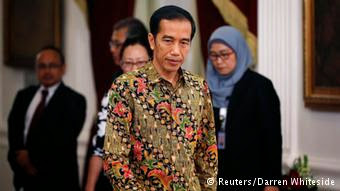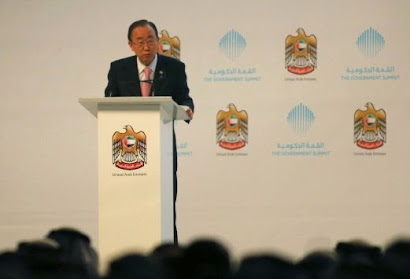Related
articles
- Indonesian Environmentalists Outraged at Light Sentences for Orangutan Killings
- Pesticide Use on Indonesia Farms ‘Alarming’: NGO
- Villages Play Part In Combatting Climate Change
- Men Jailed for 8 Months for Killing 20 Orangutans
- REDD Alert in Kalimantan As AusAid Initiative Stumbles
Komodo
Island, Indonesia. Coral gardens that were among Asia’s most spectacular,
teeming with colorful sea life just a few months ago, have been transformed
into desolate gray moonscapes by fishermen who use explosives or cyanide to
kill or stun their prey.
Dive
operators and conservationists say the government is not doing enough to
protect waters off the Komodo Islands in eastern Indonesia. They say
enforcement declined greatly following the exit of a US-based conservation
group that helped fight destructive fishing practices.
Local
officials disagree, pointing to dozens of arrests and several deadly gunbattles
with suspects.
Michael
Ishak, a scuba instructor and professional underwater photographer who has made
hundreds of trips to the area, said he’s seen more illegal fishermen than ever
this year.
The
pictures, he said, speak for themselves.
When Ishak
returned last month to one of his favorite spots, Tatawa Besar, known for its
colorful clouds of damselfish, basslets and hawksbill sea turtles, he found
that a 200-square-meter reef had been obliterated.
“At first I
thought, ‘This can’t be right. I must have jumped in the wrong place,’” he
said, adding he swam back and forth to make sure he hadn’t made a mistake. “But
it was true. All the hard coral had just been blasted, ripped off, turned
upside down. Some of it was still alive. I’ve never seen anything like it.”
The site is
among several to have been hit inside Komodo National Park, a 500,000-acre
reserve and U.N. World Heritage Site that spans several dusty, tan-colored
volcanic islands and is most famous for its Komodo dragons — the world’s
largest lizards. Its remote and hard-to-reach waters, bursting with fluorescent
reds and yellows, contain staggering levels of diversity, from iridescent
corals and octopuses with lime-green banded eyes to black-and-blue sea snakes.
They are
supposed to be protected, but fishermen are drawn there by locally popular fish
like fusiliers and high-value export species like groupers and snappers.
Fishermen
can be seen in small wooden boats, some using traditional nets or lines. Others
have been captured on video blasting sites with “bombs” — fertilizer and
kerosene mixed in beer bottles. Breathing through tubes connected to air
compressors at the surface, young men plunge to the bottom and use squeeze
bottles to squirt cyanide into the coral to stun and capture fish.
Dive
operators are increasingly seeing dead fish on the sea floor or floating on the
surface.
“The
biggest problem is that fishermen seem to be free to come into Komodo,
completely ignoring the zoning and resource use regulations,” said Jos Pet, a
fisheries scientist who has worked with numerous marine conservation groups in
the area in recent years.
He said
they are “quite simply fishing empty this World Heritage Site.”
Sustyo
Iriyono, the head of the park, said problems are being exaggerated and denied
claims of lax enforcement. “It’s only part of the black campaigns against us by
those who are hurt by our rules and orders,” he said without elaborating.
He said
rangers have arrested more than 60 fishermen over the past two years, including
a group of young men captured last month after they were seen bombing waters
off Banda island in the western part of the park.
One of the
suspects was shot and killed after the fishermen tried to escape by throwing
fish bombs at the rangers, Iriyono said. Three others, including a 13-year-old,
were slightly injured.
“You see?”
said Iriyono. “No one can say I’m not acting firmly against those who are
destroying the dive spots!”
He added
that the park is one of the few places where fish bombing is monitored with any
regularity in Indonesia, a Southeast Asian nation of more than 17,000 islands.
Divers,
however, say enforcement has dropped dramatically since 2010, when the
government reclaimed sole control of operations.
For two
decades before that, The Nature Conservancy, a U.S.-based nonprofit, had helped
the government confront destructive fishing practices there. “No-take zones”
were created, protecting spawning areas, and coastal areas also were put off
limits.
Patrols
using park rangers, navy personnel and local police were key to enforcement.
In 2005,
the government gave a 30-year permit to Putri Naga Komodo, a nonprofit joint
venture company partially funded by The Nature Conservancy and the World Bank
to operate tourist facilities in hopes of eventually making the park
financially self-sustaining.
Entrance
and conservation fees — just a few dollars at the time — went up several
tenfold for foreign tourists. With around 30,000 local and international
visitors annually at the time, that would have given the park a budget of well
over $1 million, but outraged government officials demanded that the funds go
directly into the state budget. The deal collapsed in 2010, when Putri Naga
Komodo’s permit was yanked.
“They had
no right to directly collect the entrance fees from the tourists,” said
Novianto Bambang, a Forestry Ministry official.
Dive
operators and underwater photographers have asked The Nature Conservancy and
similar organizations like WWF Indonesia, to return to Komodo and help with
conservation efforts there.
Nature
Conservancy representative Arwandridja Rukma did not address that possibility,
saying only that the organization operates in Indonesia upon the invitation of
the government.









